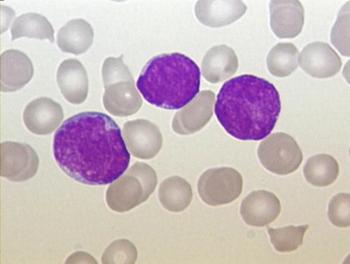
A pooled analysis of 3 randomized trials highlight the potential benefit of utilizing androgen receptor inhibitors in men aged 80 years or older with non-metastatic castration-resistant prostate cancer.

Your AI-Trained Oncology Knowledge Connection!


A pooled analysis of 3 randomized trials highlight the potential benefit of utilizing androgen receptor inhibitors in men aged 80 years or older with non-metastatic castration-resistant prostate cancer.

Research on NCCN resource-stratified guidelines for treating breast cancer could lead to overtreating patients in lower-middle and upper-middle income countries, while low-income populations could receive undertreatment.

Patients with chronic lymphocytic leukemia/small lymphocytic lymphoma were pretreated with ibrutinib saw a reduction in obinutuzumab-induced infusion-related reactions as well as cytokines and chemokines.

CancerNetwork’s latest podcast episode features a conversation with Anath Ravi, PhD, of MOLLI Surgical and Randy Miles, MD, MPH, of Massachusetts General Hospital on the risks and benefits of breast cancer screening for average-risk women under the age of 50 years.

The results from a phase 1 trial that focused on a second cohort of patients with unresectable or metastatic melanoma identified positive safety and promising topline survival outcomes when treated with the combination of UV1 and pembrolizumab.

The FDA granted a fast track designation for ALLO-605 based on its potential to treat patients with relapsed/refractory multiple myeloma who progressed on previous standard multiple myeloma therapies.

Results from the DESTINY-Breast03 trial identified that trastuzumab deruxtecan improved survival in patients with HER2-positive metastatic breast cancer compared with trastuzumab emtansine.

On this CancerNetwork® podcast, we examine the scientific evidence behind the National Comprehensive Cancer Network guidelines for hematologic malignancies.

For patients with pIIIA-N2 non–small cell lung cancer, postoperative radiotherapy after complete resection and adjuvant chemotherapy did not positively impact disease-free survival.

Older adult patients with newly diagnosed high-risk or secondary acute myeloid leukemia experienced a durable survival benefit when treated with CPX-351 over 7+3 cytarabine and daunorubicin chemotherapy.

Cemiplimab for patients with either metastatic or locally advanced basal cell carcinoma showed antitumor activity in a phase 2 trial.

CancerNetwork® speaks with Kami Maddocks, MD, in part 2 of a 3-part series on CD19–directed agents and other second-line agent for relapsed/refractory diffuse large B-cell lymphoma.

The combination of lenvatinib plus pembrolizumab showed antitumor activity and a manageable safety profile for treatment-naïve or previously treated patients with metastatic renal cell carcinoma.

Data from a phase 2 clinical trial with pembrolizumab and cetuximab yielded promising clinical activity in patients with recurrent or metastatic head and neck squamous cell carcinoma.

Here are some of the important updates from CancerNetwork last week you might have missed in the world of oncology, featuring novel combinations for triple-negative breast cancer, genetic testing for gastrointestinal malignancies, and the FDA approval of belumosudil for chronic graft-versus-host disease.

Recent data indicated that the combination of neoadjuvant docetaxel, oxaliplatin, and S-1 followed by surgery and adjuvant S-1 was effective and tolerable in a population of Korean patients who had locally advanced gastric cancer.

Bempegaldesleukin plus nivolumab demonstrated positive antitumor activity while maintaining a tolerable safety profile in the PIVOT-02 trial for patients with previously untreated metastatic melanoma in the first-line setting.

Patients with hematologic malignancies and COVID-19 may experience a survival benefit after receiving convalescent plasma therapy.

Sintilimab with gemcitabine plus platinum produced superior clinical benefit for patients with locally advanced or metastatic squamous cell non–small cell lung cancer when compared with gemcitabine plus platinum alone.

Compared with a control therapy, ruxolitinib increased overall response and improved failure-free survival for patients with glucocorticoid-refractory or -dependent chronic graft-versus-host disease.

Robert A. Figlin, MD, spoke with CancerNetwork® about emerging second-line therapies as the paradigm of first-line treatment evolves for patients with metastatic clear cell renal cell carcinoma.

Take a look at some of the important updates from CancerNetwork last week you might have missed in the world of oncology from the FDA and the journal ONCOLOGY.

This special edition of the “Oncology Peer Review On-The-Go” dives into recent updates and important treatment strategies for extensive-stage SCLC management.

The phase 2 GIMEMA LAL1913 trial identified poor outcomes and increased minimal residual disease persistence among patients with Philadelphia-like acute lymphoblastic leukemia.

Foundation Medicine announced the expanded indication for FoundationOne Liquid CDx as a companion diagnostic to identify MET exon 14 skipping mutations in metastatic non–small cell lung cancer.

Adjuvant radiation therapy, when compared with early salvage radiation therapy, reduced the risk of all-cause mortality for patients with adverse pathology at radical prostatectomy.

The FDA supported Athenex to continue developing oral paclitaxel and encequidar for patients with metastatic breast cancer.

The pharmaceutical company plans to voluntarily withdraw the accelerated approval indication for pembrolizumab in the third line setting for patients with gastric cancer within the coming months.

CancerNetwork®’s podcast hosted 2 experts to discuss the current state of biosimilar prescriptions and the need for change to improve the system overall.

Catch up on the important updates from CancerNetwork® last week you might have missed in the world of oncology.